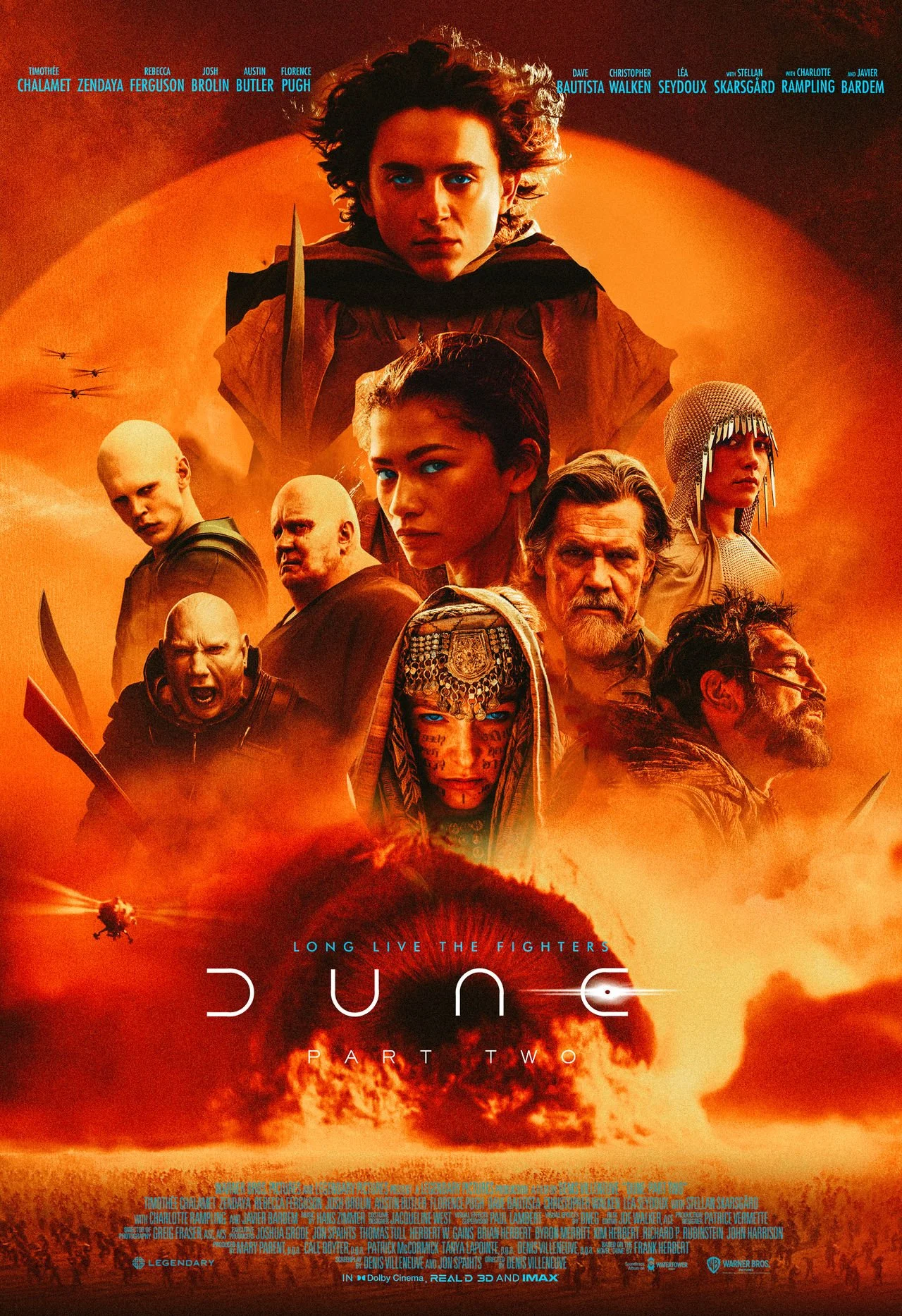Dune Part 2
A spectacular, and at times emotional follow-up to Denis Villenueve’s 2021 introduction to the world of Dune. Go see this on the biggest screen that you can find.
Full disclosure: I’m a big fan of Frank Herbert’s book Dune. I read it first in high school, and have read it a couple of times since, along with the 5 sequel books that Herbert wrote (there have been more based on his notes and written by others). So my thoughts on the Dune movies are naturally going to be coloured by my knowledge of the source material, both in terms of what the story originally is, and how the films deviate from that story.
Review
For a long time, Dune was thought to be one of the most “unfilmable” books ever written. Over the years there had been numerous attempts to bring it to the screen that failed, and even the lack of success for David Lynch’s 1984 film would seem to have backed up the “unfilmable” claim. In large part that’s because the book is about so much. It explores themes of prophesy and predestination, ecology, eugenics, dynastic struggle, decaying empires, the white saviour trope, single product economies, and gender roles, among other things. So how the hell do you make a coherent movie out of all of that?!?
Denis Villenueve’s first foray into the world of Dune came in 2021 was a massive gamble, telling only half of the story of the book and hoping that audiences would like it enough for Warner Bros. to greenlight a Part 2. Obviously, it worked. The movie was a success for a lot of reasons. It touched on a lot of the themes mentioned above, introduced us to the complex universe of Herbert’s creation, and yet still managed to tell a compelling story. It made a few small changes to the original story, and had some omissions, but nothing that left me feeling let down by the attempt to translate Dune to film. In fact, the opposite was true. I loved it and thought that Villenueve had done just about as good a job as possible. I couldn’t wait to see where he would take the story next.
Chalamet’s Paul Atreides and Zendaya’s Chani. Their complicated love story is the emotional heart of the movie.
This time around, there were a few changes and omissions that I was a bit disappointed with, but overall it was a hell of a ride, and the movie stands up as a worthy sequel to the first one. At times Dune Part 2 left me in awe at the spectacle and ambitious scope of the movie, but also contained a number of genuinely touching emotional moments. The emotional core of the film is a love story between the exiled heir of the “great house” Atreides, Paul (Timothée Chalamet), and the skeptical Fremen girl Chani (Zandaya).
Dune Part 1 left off with Paul Atreides and his mother Jessica fleeing the slaughter of their great house by the evil Harkonnens, and heading into the desert where they had met, but not yet been fully accepted by the indigenous Fremen. Part 2 picks up there, as Paul tries to make himself welcome into the Fremen by becoming a warrior, while his pregnant mother falls back on her Bene Gesserit ways by attempting to stoke religious fervor for Paul as the long prophesied “Lisan Al-Gaib”, the “Voice from the Outer-world”, a messiah who will lead the Fremen to conquer their enemies and transform the planet of Arrakis into a paradise.
Paul, who has been having visions since before his arrival on Arrakis, struggles against his mother’s designs because he sees snippets of a future where his leadership brings about unimaginable violence and death. So instead, he’s content to become just another Fremen warrior, a sentiment that is encouraged by Chani, as their relationship deepens. Meanwhile, because of her Bene Gesserit training, Jessica is convinced to become a “Reverend Mother”, a process that involves drinking a sandworm-created poison called “The Water of Life” and taking on the consciousness of generations of Reverend Mothers who have come before. Unfortunately, no one realizes that she’s pregnant, and her unborn daughter also absorbs these consciousnesses and becomes fully aware, speaking with her mother from the womb.
Paul and the rest of the Fremen warriors concentrate on their campaign of guerrilla warfare, crippling production of the all-important “spice”, and causing Baron Harkonnen to lose faith in the abilities of his brutal nephew Rabban.
Just as in the first film, for as much as this is an epic story, with massive set pieces and thrilling actions, many of the scenes are quieter moments involving intimate conversations between two or more people. All of this works only because of the tremendous work of the cast. In addition to Chalamet and Zendaya, there are great performances from a number of others including the underrated Jessica Ferguson, Austin Butler, Stellen Skarsgard, and Javier Bardem, who adds touches of much needed humour to his character Stilgar.
Spoilers Ahead
Paul Atreides embracing his destiny as a messianic leader of fanatical followers.
On a raid of a spice harvesting operation, Paul is reunited with an old friend, Gurney Halleck, who survived the massacre of the Atreides and has been hiding out living as a spice smuggler. He carries with him a secret that could change the nature of the Fremen battle strategy – the hidden location of the Atreides family atomic weapons.
Meanwhile, fed up with Rabban’s failures, Baron Harkonnen brings his heir and nephew Feyd-Rautha to Arrakis, to put down the Fremen revolt. Feyd-Rautha switches tactics by avoiding battle with the Fremen but instead destroying the very hills in which they have their cave dwellings (or sietch). This results in the massacre of Paul and Chani’s home sietch of Sietch Tabr, and forces Paul and the Fremen to flee to southern Arrakis. Because he didn’t see the attack coming due to his fractured, incomplete visions, Paul decides that he must do what his mother has been urging him to do, drink the Water of Life (normally lethal to men) and become the mythical Kwisatz Haderach, the person that the Bene Gesserit’s centuries long breeding program has been designed to produce, someone whose mind will be able to span space and time.
Just writing those those sentences was complicated, so I’m sure people unfamiliar with the story will have either stopped reading by now, or are puzzling at the screen saying to themselves, “what the fuck?” But it’s a testament to the brilliance of these films that Villenueve has somehow managed to make this all make sense, or at least, managed to make the story easy to follow without us needing to think too hard about all of that.
After becoming the Kwisatz Haderach, Paul sees a way to defeat both the Harkonnens and the Emperor who secretly helped them. He finally gives into the prophesy, becoming the messianic figure his mother had planned for him, and fanning the flames of the adulation and worship of millions of Fremen true believers. This, however, disappoints Chani, who didn’t want a messiah, only an equal in the Fremen struggle, and loves Paul as he was. The final plan involves luring the Emperor with his legions of Sardaukar soldiers to Arrakis, and attacking during a massive sandstorm by blowing a hole in the range of rocky hills surrounding the capital, and riding sandworms into battle with his millions of fanatical Fremen followers. Paul’s plan succeeds, and he kills both Baron Harkonnen and Feyd-Rautha, and forces the Emperor to relinquish power to him. However, it costs him Chani, who heads back into the desert, alone.
There are two big changes from the book, one of which disappointed me, and one is more of a wait-and-see. The first one is the fact that we never actually see Paul’s sister being born, in the books named Alia, or later by her more colourful name St. Alia-of-the-Knife. In the book, she is born during their exile in the desert, and is essentially a fully conscious toddler. Perhaps that would have been too hard to film, but her character is one of my favourites, and the movie gives a couple of her moments to Paul, including the killing of Baron Harkonnen, and the Bene Gesserit Reverend Mother’s exclamation of “abomination!” after she realizes what Alia is.
The other is the change to the relationship between Paul and Chani. Although there is tension, in the book it doesn’t end with their separation. In fact, after Paul’s decision to marry the Emperor’s daughter to secure the throne, Jessica remarks to Chani how she feels sorry for the princess, because she’ll never receive the love that Chani does. The final lines of the novel are “we, Chani, we who carry the name of concubine – history will call us wives.”
Which brings me to my final comment of this increasingly lengthy review – will there be a third movie? In recent weeks, Villenueve has made no secret of the fact that he would like to make a third movie, and the incomplete love story between Paul and Chani, and the teaser casting of Anya Taylor-Joy as the voice of Alia would suggest that he’s planned things in just this way. Although this movie wrapped up most of the tale of the book Dune, Paul Atreides’ story is really completed with the sequel, Dune Messiah. I hope we see it, because so far Villenueve and these movies are knocking it out of the park. Unfilmable, no longer.
The Harkonnen homeworld of Geidi Prime. Brutal and unforgiving, just like the family that controls it.
5 Quick Hits
The score by Hans Zimmer was stirring and bombastic as always, but didn’t hit as quite as hard as the first film, perhaps because the themes were familiar. If there’s a third movie, I hope he expands the musical themes a bit more.
Rebecca Ferguson’s character was much more complex in this film. In the first movie she came across as a loving and protective mother. In this one, schemes and ambitions for her son come much more to the fore, and at times it left me wondering, “is she the real villain in this story?” It was great for the movie to be able to further explore this great character that is part loving mother, part grieving widow, and part master manipulator.
Lea Seydoux is also in this movie, and her character of Lady Fenring was underutilized. She’s a very minor character in the book, but IF there is a third film, I imagine she might have a role to play given how the movie included her character. It seems important that Villenueve chose to include the fact that Paul isn’t the only person carrying on the Harkonnen bloodline. If you’re going to include this character at all, and cast Lea Seydoux, you might as well do something with the part.
The scenes set in the Harkonnen homeworld of Geidi Prime, part of which was filmed using infra-red cameras was an amazingly ambitious filming choice, and in my opinion, a great success. It created a completely different feeling world, and gave us some vistas and epic scenes unlike anything we’ve seen in movies before.
The introduction of the Atreides family atomic weapons, for those unfamiliar with the book, probably came across as a bit of a “why didn’t you lead with that?” moment. If they had atomic weapons that whole time, why didn’t they use them when they were being massacred by the Harkonnen and Sardaukar. However, in the book it’s explained that atomics can’t be used against the shield technology everyone uses. When Paul uses it in the final battle, therefore, he doesn’t use it against the enemy troops, but simply against the rocky shield wall to blast a hole through so that his sandworms can get into the capital.








